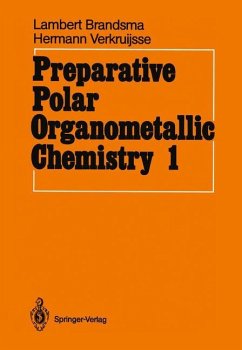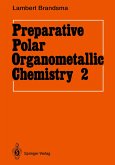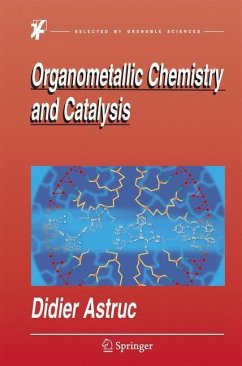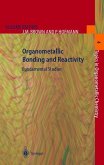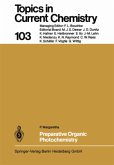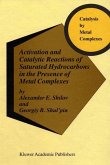- Broschiertes Buch
- Merkliste
- Auf die Merkliste
- Bewerten Bewerten
- Teilen
- Produkt teilen
- Produkterinnerung
- Produkterinnerung
Polar organometallic compounds are indispensable for the synthetic chemist. As this book shows, these almost ideal reagents are easy to prepare with high specificity under mild conditions and yet react quite readily with a great variety of substrates. Many compounds can be metallated directly at positions which would otherwise be difficult to substitute. Functional groups and heteroatoms already present in a molecule direct metallation to sites in their vicinity. The rules which govern polar organometallic chemistry often are not dominated by the usual n-delocalization and inductive effects;…mehr
Andere Kunden interessierten sich auch für
![Preparative Polar Organometallic Chemistry Preparative Polar Organometallic Chemistry]() Lambert BrandsmaPreparative Polar Organometallic Chemistry38,99 €
Lambert BrandsmaPreparative Polar Organometallic Chemistry38,99 €![Organometallic Chemistry and Catalysis Organometallic Chemistry and Catalysis]() Didier AstrucOrganometallic Chemistry and Catalysis60,99 €
Didier AstrucOrganometallic Chemistry and Catalysis60,99 €![Organometallic Bonding and Reactivity Organometallic Bonding and Reactivity]() John M. Brown / P. Hofmann (eds.)Organometallic Bonding and Reactivity154,99 €
John M. Brown / P. Hofmann (eds.)Organometallic Bonding and Reactivity154,99 €![Preparative Organic Photochemistry Preparative Organic Photochemistry]() P. MargarethaPreparative Organic Photochemistry77,99 €
P. MargarethaPreparative Organic Photochemistry77,99 €![Catalytic Carbonylation Reactions Catalytic Carbonylation Reactions]() Catalytic Carbonylation Reactions220,99 €
Catalytic Carbonylation Reactions220,99 €![Activation and Catalytic Reactions of Saturated Hydrocarbons in the Presence of Metal Complexes Activation and Catalytic Reactions of Saturated Hydrocarbons in the Presence of Metal Complexes]() A. E. ShilovActivation and Catalytic Reactions of Saturated Hydrocarbons in the Presence of Metal Complexes154,99 €
A. E. ShilovActivation and Catalytic Reactions of Saturated Hydrocarbons in the Presence of Metal Complexes154,99 €![Activation of Unreactive Bonds and Organic Synthesis Activation of Unreactive Bonds and Organic Synthesis]() Activation of Unreactive Bonds and Organic Synthesis220,99 €
Activation of Unreactive Bonds and Organic Synthesis220,99 €-
-
-
Polar organometallic compounds are indispensable for the synthetic chemist. As this book shows, these almost ideal reagents are easy to prepare with high specificity under mild conditions and yet react quite readily with a great variety of substrates. Many compounds can be metallated directly at positions which would otherwise be difficult to substitute. Functional groups and heteroatoms already present in a molecule direct metallation to sites in their vicinity. The rules which govern polar organometallic chemistry often are not dominated by the usual n-delocalization and inductive effects; dipolar interactions, chelation, polarization, etc. often can be much more important. This affords novel synthetic opportunities. A good example is the development of a basically new type of aromatic substitution chemistry not based on positively charged intermediates. Seebach's injunction, "Thinking of polar organometallic compounds as carbanions is an impoverishment rather than a simplification" (International Symposium, Chemistry of Carbanions, Durham 1984), stresses the need to consider the metal not only as an integral, but perhaps also as the key component of these reagents. Rather than wandering off as solvated cations and acting as uninvolved spectators, the metals, rather than the anion moieties, can initiate and govern the subsequent reactions. To the founders of this field, e. g. Grignard, Ziegler, Gilman, Wittig, and their followers, the metal was critical. The title of Schlosser's book, "Polare Organometalle", certainly was apt.
Produktdetails
- Produktdetails
- Verlag: Springer / Springer Berlin Heidelberg / Springer, Berlin
- Artikelnr. des Verlages: 978-3-540-16916-1
- 1990.
- Seitenzahl: 256
- Erscheinungstermin: 1. Dezember 1986
- Englisch
- Abmessung: 244mm x 170mm x 15mm
- Gewicht: 442g
- ISBN-13: 9783540169161
- ISBN-10: 3540169164
- Artikelnr.: 09187071
- Verlag: Springer / Springer Berlin Heidelberg / Springer, Berlin
- Artikelnr. des Verlages: 978-3-540-16916-1
- 1990.
- Seitenzahl: 256
- Erscheinungstermin: 1. Dezember 1986
- Englisch
- Abmessung: 244mm x 170mm x 15mm
- Gewicht: 442g
- ISBN-13: 9783540169161
- ISBN-10: 3540169164
- Artikelnr.: 09187071
to Volume 1 and Instructions for the Use of this Book and its Indexes.- I. Organometallic Reagents, Solvents and Laboratory Equipment.- 1. Strongly Basic Reagents used in Organic Synthesis.- 2. Solvents and Some Reagents: Their Analysis, Purification and Storage.- 3. Laboratory Equipment and Some General Remarks Concerning Performance of the Procedures.- 4. Safety, Handling and Methods of Disposal.- 4.1 Introduction.- 4.2 Organoalkali Reagents.- 4.3 Alkali Metals.- 4.4 Alkali Metal Amides.- 5. Experimental Procedures.- 5.1 n-Butyllithium in Diethyl Ether.- 5.2 n-Butyllithium TMEDA (in Hexane).- 5.3 n-Butyllithium, Complexed with Potassium t-Butoxide in THF.- 5.4 n-Butyllithium, Complexed with Sodium- or Potassium t-Butoxide and TMEDA in Hexane or Pentane.- 5.5 Lithium Diisopropylamide.- 5.6 Lithium Amide in Liquid Ammonia.- 5.7 Sodamide in Liquid Ammonia.- 5.8 Potassium Amide in Liquid Ammonia.- II Reactivity of Polar Organometallic Intermediates.- 1. Introduction.- 2. General Remarks About Reactivity.- 3. Alkylation Reactions.- 3.1 Reactivity of the Various Types of Alkylation Reagents.- 3.2 Possible Influence of the Thermodynamic Basicity and Polarisability.- 3.3 Reactivity of Some ortho-Lithiated Benzene Derivatives.- 4. Acylation Reactions.- 5. Carboxylation.- 6. Additions to Carbonyl Compounds.- 7. Additions to Heterocumulenes.- 8. Reactions with Sulfenylating Reagents.- 9. Reactions with Elemental Sulfur, Selenium and Tellurium.- 10. Reactions with Sulfur Dichloride.- 11. Trimethylsilylation.- 12. Introduction of Chlorine, Bromine and Iodine.- 13. Protonation and Deuteration.- 14. Exchange Between Counter Ions.- III. Metallated Olefinic and Allenic Hydrocarbons.- 1. Deprotonation with Strongly Basic Reagents.- 2. Halogen-Lithium and Tin-Lithium Exchange.- 3. Direct Preparation from Halogen Compounds and Metal.- 4. Experimental Procedures.- 4.1 Vinylmagnesium Bromide.- 4.2 Trimethylsilylethene.- 4.3 Tetravinyltin.- 4.4 Reaction of Alkenylmagnesium Bromide with Benzaldehyde.- 4.5 1-Cyclohexenyl- and 1-Cycloheptenyllithium.- 4.6 1-Cyclohexenecarboxaldehyde and 1-Cycloheptenecarboxaldehyde.- 4.7 Metallation of Norbornene and Norbornadiene.- 4.8 Norbornadienecarboxaldehyde.- 4.9 Reaction of Norbornenyllithium with Methyl Choroformate.- 4.10 Metallation of Cyclopentene and Subsequent Methylthiolation.- 4.11 2-Hexyl-1-Methylcyclopropene.- 4.12 Lithiation of 1-Methylcyclopropene and Subsequent Reaction with Benzaldehyde.- 4.13 1,3-Dimetallation of Vinylacetylene and Subsequent Reaction with two Equivalents of Me3SiCl and one Equivalent of w-C7H15Br.- 4.14 Metallation of Allene with Butyllithium.- 4.15 1,2-Decadiene from Allenyllithium.- 4.16 2,3-Butadienoic Acid from Allenyllithium.- 4.17 Allenylmagnesium Bromide.- 4.18 Lithiation of 1.1-Dimethylallene.- 4.19 Metallation of 2-Alkynes with Butyllithium.- 4.20 1-Chlorocyclohexene and 1-Chlorocycloheptene.- 4.21 l-Bromo-2-Merliylpropene.- 4.22 Vinylacetylene.- 4.23 1-Methylcyclopropene.- 4.24 Metallation of Ethene.- 4.25 Metallation of Norbornene and Norbornadiene with BuLi · t-BuOK · TMEDA.- 4.26 Z-2-Lithio-l-Ethoxyethene.- 4.27 1-Lithio-l-Phenylethene.- IV. Metallation of Hetero-Substituted Unsaturated Systems.- 1. Introduction.- 2. ?-Metallation of 1-Alkenyl Ethers, -Thioethers and Related Systems.- 3. ?-Metallation of 1.3-Dienyl Ethers and -Thioethers.- 4. ?-Metallated Haloalkenes.- 5. ?-Metallated Allenic Ethers, -Thioethers and -Amines.- 6. Metallated 1,2,3-Butatrienyl Ethers, -Sulfides and -Amines.- 7. Addendum: Metallation of N,N-Dialkylformamides and-Thioformamides.- 8. Experimental Procedures.- 8.1 Metallation of Ethyl Vinyl Ether.- 8.2 Coupling of Metallated Ethyl Vinyl Ether with Nonyl Bromide and Acetone.- 8.3 Metallation of 2,3-Dihydrofuran and 2,3-Dihydropyran and Subsequent Alkylthiolation.- 8.4 Metallation of 5-Chloro-2,3-Dihydropyran and Subsequent Methylthiolation.- 8.5 ?-Metallation of Methyl Vinyl Sulfide.- 8.6 Reaction of Metallated Methyl Vinyl Sulfide with Oxirane, Acetone and Methyl Isothiocyanate.- 8.7 Lithiation of Z-1,2-bis (Methylthio)Ethene and Subsequent Methylation.- 8.8 Lithiation of 1,4-Dithiin and Subsequent Functionalization.- 8.9 Metallation of E- and Z-1-Methoxy-1,3-Butadiene and 1-Methylthio-1,3-Butadiene.- 8.10 Metallation of 2H-Thiopyran.- 8.11 Metallation of Zs-Dichloroethene and Subsequent Alkylation with Bromohexane.- 8.12 Conversion of 2-Chloro-1,1-bis(Dimethylamino)Ethene into bis(Dimethylamino)Ethyne.- 8.13 Metallation of Methoxyallene.- 8.14 Metallation of 1-Alkynyl Sulfides in Organic Solvents.- 8.15 Metallation of Allenic Amines and Acetylenic Amines.- 8.16 Trimethylsilylation of Metallated Diethylaminoallene.- 8.17 Conversion of a 2-Alkynyl Ether into an 1-Alkylated Allenyl Ether.- 8.18 Conversion of a Tertiary Acetylenic Amine into the Allenic Isomer via the Metallic Intermediates.- 8.19 Preparation of Dimethylaminobutatriene via the Metallic Intermediate.- 8.20 Preparation of a Metallated Cumulenic Amine via 1,4-Elimination, and Subsequent Reaction with Trimethylchlorosilane.- 8.21 Lithiation of l-Ethylthio-3-Buten-l-Yne and Subsequent Hydrolysis to Ethylthiobutatriene.- 8.22 5-Chloro-2,3-Dihydropyran.- 8.23 Vinyl Alkyl and Vinyl Aryl Sulfides.- 8.24 Z-bis(Methylthio)Ethene.- 8.25 2H-Thiopyran.- 8.26 1,2-Chloro-1,1-Bis(Dimethylamino/Ethene.- 8.27 3-Methoxy 3-Methyl-l-Butyne and l-(Dimethylamino)-4-Methoxy-4-Methyl-2-Pentyne.- 8.28 Lithiation of N,N-Dimethylformamide and N,N-Dimethyl-thioformamide.- 8.29 N,N-Dimethylthioformamide.- V. Metallated Hetero-Aromatic Compounds.- 1. Introduction.- 2. Metallated Furans, Pyrroles, Thiophenes, Selenophenes and Tellurophenes.- 2.1 Direct Metallation by Strong Bases.- 2.2 Halogen-Lithium Exchange.- 2.3 Grignard Derivatives.- 3. Metallated Pyridines.- 3.1 Direct Metallation.- 3.2 Halogen-Lithium Exchange.- 4. Metallated Hetero-Aromatics with more than one Hetero Atom.- 5. Experimental Procedures.- 5.1 2-Methylthiophene.- 5.2 3-Allylthiophene.- 5.3 2-Butylthiophene.- 5.4 2-(2-Thienyl)Ethanol.- 5.5 2-Furancarboxaldehyde Diethylacetal and 2-Thiophenecarboxaldehyde Diethylacetal.- 5.6 2-Octylfuran.- 5.7 2-Benzylfuran and 2-Benzylthiophene.- 5.8 2-Butyl-l-Methylpyrrole.- 5.9 3-Bromo-2-Ethylthiophene and 3-Bromo-2-(l-Hydroxyethyl)-Thiophene.- 5.10 5-Ethyl-2-(Methylthio)Thiazole.- 5.11 2-Methyl-2H-Thieno[2,3-b]Thiopyran.- 5.12 2-Bromofuran.- 5.13 2-Iodofuran.- 5.14 l-Methylpyrrole-2-Carboxylic Acid.- 5.15 l-Methyl-2-(Methylthio)Imidazole.- 5.16 2-Trimethylsilyl-1.3-Thiazole.- 5.17 2-(Trimethylsilyl)Benzothiazole.- 5.18 Reaction of Benzothiazole with Sodamide in Liquid Ammonia and Subsequent Ethylation and Methylthiolation. Formation of 2-(Ethylthio)Phenyl Isocyanide and 2-(Methylthio)benzothiazole.- 5.19 4-Methyl-2-Thiazolecarboxaldehyde.- 5.20 2-Tellurophenecarboxaldehyde.- 5.21 2-Selenophenecarboxaldehyde.- 5.22 Methyl 2-Thiophenecarboxylate.- 5.23 N,N-Dimethyl-2-Furancarboxamide and N,N-Dimethyl-2-Thiophenecarboxamide.- 5.24 Methyl-2-Thiophenecarbodithioate.- 5.25 Methyl-2-Furancarbodithioate.- 5.26 3-Thiophenethiol.- 5.27 2-(Methylseleno)Thiophene and 2-(Methyltelluro)Thiophene.- 5.28 Reaction of Metallated Hetero-Aromates with Methyl Isothiocyanate Phenyl Isothiocyanate, Phenyl Isocyanate and Phenyl Sulfinylamine.- 5.29 Regiospecific Vicinal Metallation of 3-Bromothiophene and Preparation of Derivatives.- 5.30 Lithiation of 2-Bromofuran and 2-Bromothiophene in the 5-Position; Preparation of 2-Bromo-5-(Methylthio)Furan and-Thiophene.- 5.31 3-Iodothiophene.- 5.32 3-t-Butoxythiophene.- 5.33 3-Substituted Thiophenes from 3-Bromothiophene.- 5.34 2-Formyl-3-(Methoxymethyl)Thiophene.- 5.35 Di(2-Furyl)Sulfide,di(2-Thienyl)Sulfide and di(3-Thienyl)Sulfide.- 5.36 2,2?-Bifury1, 2,2?-Bithienyl and 3,3?-Bithienyl.- 5.37 2,5-Dimetallation of Thiophene. Preparation of 2,5-bis(Trimethylsilyl)Thiophene.- 5.38 2,5-Dimetallation of Furan. Preparation of 2,5-bis(Methylthio)Furan.- 5.39 1-Methyl-2-(Methylthio)Pyrrole.- 5.40 2-Iodo-1-Methylpyrrole.- 5.41 2-Chlorobenzo(b)Thiophene.- 5.42 2-Fluoro-3-Methylthio-Pyridine.- 5.43 3-Chloro-4-Trimethylsilyl-Pyridine.- 5.44 3-Deuterio- and 3-Methylthio-Pyridine.- 5.45 3-Trimethylsilyl-Quinoline.- 5.46 4-Iodopyridine.- 5.47 3-Bromothiophene.- 5.48 2-Bromothiophene.- 5.49 3-Bromoquinoline.- 5.50 2-Thienyl Propargyl Sulfide 2H-Thieno(2,3-b)Thiopyran and 2-Methylthieno(2,3-b)Thiophene.- 5.51 Methyl Dithiocarbamate.- 5.52 2-Methylthio-Thiazole and 4-Methyl-2-Methylthio-Thiazole.- 5.53 Thiazole and 4-Methylthiazole.- 5.54 Selenophene and Tellurophene.- 5.55 Methyl Thiocyanate.- 5.56 Sulfur Dichloride.- VI. Metallated Aromatic Compounds.- 1. Metallated Aromatic Hydrocarbons.- 1.1 Deprotonation by Strongly Basic Reagents.- 1.2 Bromine-Lithium Exchange.- 1.3 Reaction of Arene Derivatives with Metals.- 2. Metallated Hetero-Substituted Arenes.- 2.1 Deprotonation by Strongly Basic Reagents.- 2.2 Halogen-Lithium Exchange.- 3. Experimental Procedures.- 3.1 General Procedure for Bromine-Lithium Exchange.- 3.2 Derivatization Reactions with Aryllithium, Obtained by Br-Li Exchange.- 3.3 Reaction of Aryllithium with Carbon Disulfide and Subsequent Methylation.- 3.4 Reaction of ?-Fluorophenyllithium with Epoxyethane and Paraformaldehyde.- 3.5 Phenyllithium from Benzene and BuLi · TMEDA in Hexane.- 3.6 Phenylpotassium from Benzene, BuLi · t-BuOK and TMEDA in Hexane.- 3.7 Metallation of Naphthalene with BuLi, t-BuOK · TMEDA and Subsequent Methylthiolation.- 3.8 Preparation of 1,8-Dilithionaphthalene.- 3.9 Reaction of Phenyllithium.TMEDA with Elemental Selenium and Tellurium.- 3.10 ortho-Metallation of Hetero-Substituted Benzene and Naphthalene with BuLi · TMEDA in Hexane.- 3.11 Ring-Metallation of Benzyl Dimethylamine, N,N-Dimethylaniline and Benzylalcohol.- 3.12 Metallation of Phenyl Ethers with BuLi in THF.- 3.13 Metallation of Fluorobenzene with BuLi · t-BuOK and BuLi · TMEDA.- 3.14 Dimetallation of Phenylacetylene with BuLi · t-BuOK in THF-Hexane and with BuLi · t-BuOK · TMEDA in Hexane.- 3.15 Lithiation of N,N-Dimethyl-Benzenesulfonamide and Subsequent Methylation.- 3.16 Metallation of N-Methyl Benzenecarbothioamide and Subsequent Trimethylsilylation.- 3.17 Protection of the Formyl Group in Benzaldehyde and Subsequent ortho-Lithiation and Trimethylsilylation.- 3.18 Reaction and Phenylmagnesium Bromide with 1,2-Dibromodiethyl Ether, Preparation of 1-Ethoxy-l-Phenylethene.- 3.19 Generation of o-Lithiochlorobenzene from 2-Bromochlorobenzene.- 1. Generation of Polar Organometallic Intermediate by Deprotonation with Strongly Basic Reagents.- 2. Metallation-Functionalization Index.- 3. Index of Reaction Types.- References.
to Volume 1 and Instructions for the Use of this Book and its Indexes.- I. Organometallic Reagents, Solvents and Laboratory Equipment.- 1. Strongly Basic Reagents used in Organic Synthesis.- 2. Solvents and Some Reagents: Their Analysis, Purification and Storage.- 3. Laboratory Equipment and Some General Remarks Concerning Performance of the Procedures.- 4. Safety, Handling and Methods of Disposal.- 4.1 Introduction.- 4.2 Organoalkali Reagents.- 4.3 Alkali Metals.- 4.4 Alkali Metal Amides.- 5. Experimental Procedures.- 5.1 n-Butyllithium in Diethyl Ether.- 5.2 n-Butyllithium TMEDA (in Hexane).- 5.3 n-Butyllithium, Complexed with Potassium t-Butoxide in THF.- 5.4 n-Butyllithium, Complexed with Sodium- or Potassium t-Butoxide and TMEDA in Hexane or Pentane.- 5.5 Lithium Diisopropylamide.- 5.6 Lithium Amide in Liquid Ammonia.- 5.7 Sodamide in Liquid Ammonia.- 5.8 Potassium Amide in Liquid Ammonia.- II Reactivity of Polar Organometallic Intermediates.- 1. Introduction.- 2. General Remarks About Reactivity.- 3. Alkylation Reactions.- 3.1 Reactivity of the Various Types of Alkylation Reagents.- 3.2 Possible Influence of the Thermodynamic Basicity and Polarisability.- 3.3 Reactivity of Some ortho-Lithiated Benzene Derivatives.- 4. Acylation Reactions.- 5. Carboxylation.- 6. Additions to Carbonyl Compounds.- 7. Additions to Heterocumulenes.- 8. Reactions with Sulfenylating Reagents.- 9. Reactions with Elemental Sulfur, Selenium and Tellurium.- 10. Reactions with Sulfur Dichloride.- 11. Trimethylsilylation.- 12. Introduction of Chlorine, Bromine and Iodine.- 13. Protonation and Deuteration.- 14. Exchange Between Counter Ions.- III. Metallated Olefinic and Allenic Hydrocarbons.- 1. Deprotonation with Strongly Basic Reagents.- 2. Halogen-Lithium and Tin-Lithium Exchange.- 3. Direct Preparation from Halogen Compounds and Metal.- 4. Experimental Procedures.- 4.1 Vinylmagnesium Bromide.- 4.2 Trimethylsilylethene.- 4.3 Tetravinyltin.- 4.4 Reaction of Alkenylmagnesium Bromide with Benzaldehyde.- 4.5 1-Cyclohexenyl- and 1-Cycloheptenyllithium.- 4.6 1-Cyclohexenecarboxaldehyde and 1-Cycloheptenecarboxaldehyde.- 4.7 Metallation of Norbornene and Norbornadiene.- 4.8 Norbornadienecarboxaldehyde.- 4.9 Reaction of Norbornenyllithium with Methyl Choroformate.- 4.10 Metallation of Cyclopentene and Subsequent Methylthiolation.- 4.11 2-Hexyl-1-Methylcyclopropene.- 4.12 Lithiation of 1-Methylcyclopropene and Subsequent Reaction with Benzaldehyde.- 4.13 1,3-Dimetallation of Vinylacetylene and Subsequent Reaction with two Equivalents of Me3SiCl and one Equivalent of w-C7H15Br.- 4.14 Metallation of Allene with Butyllithium.- 4.15 1,2-Decadiene from Allenyllithium.- 4.16 2,3-Butadienoic Acid from Allenyllithium.- 4.17 Allenylmagnesium Bromide.- 4.18 Lithiation of 1.1-Dimethylallene.- 4.19 Metallation of 2-Alkynes with Butyllithium.- 4.20 1-Chlorocyclohexene and 1-Chlorocycloheptene.- 4.21 l-Bromo-2-Merliylpropene.- 4.22 Vinylacetylene.- 4.23 1-Methylcyclopropene.- 4.24 Metallation of Ethene.- 4.25 Metallation of Norbornene and Norbornadiene with BuLi · t-BuOK · TMEDA.- 4.26 Z-2-Lithio-l-Ethoxyethene.- 4.27 1-Lithio-l-Phenylethene.- IV. Metallation of Hetero-Substituted Unsaturated Systems.- 1. Introduction.- 2. ?-Metallation of 1-Alkenyl Ethers, -Thioethers and Related Systems.- 3. ?-Metallation of 1.3-Dienyl Ethers and -Thioethers.- 4. ?-Metallated Haloalkenes.- 5. ?-Metallated Allenic Ethers, -Thioethers and -Amines.- 6. Metallated 1,2,3-Butatrienyl Ethers, -Sulfides and -Amines.- 7. Addendum: Metallation of N,N-Dialkylformamides and-Thioformamides.- 8. Experimental Procedures.- 8.1 Metallation of Ethyl Vinyl Ether.- 8.2 Coupling of Metallated Ethyl Vinyl Ether with Nonyl Bromide and Acetone.- 8.3 Metallation of 2,3-Dihydrofuran and 2,3-Dihydropyran and Subsequent Alkylthiolation.- 8.4 Metallation of 5-Chloro-2,3-Dihydropyran and Subsequent Methylthiolation.- 8.5 ?-Metallation of Methyl Vinyl Sulfide.- 8.6 Reaction of Metallated Methyl Vinyl Sulfide with Oxirane, Acetone and Methyl Isothiocyanate.- 8.7 Lithiation of Z-1,2-bis (Methylthio)Ethene and Subsequent Methylation.- 8.8 Lithiation of 1,4-Dithiin and Subsequent Functionalization.- 8.9 Metallation of E- and Z-1-Methoxy-1,3-Butadiene and 1-Methylthio-1,3-Butadiene.- 8.10 Metallation of 2H-Thiopyran.- 8.11 Metallation of Zs-Dichloroethene and Subsequent Alkylation with Bromohexane.- 8.12 Conversion of 2-Chloro-1,1-bis(Dimethylamino)Ethene into bis(Dimethylamino)Ethyne.- 8.13 Metallation of Methoxyallene.- 8.14 Metallation of 1-Alkynyl Sulfides in Organic Solvents.- 8.15 Metallation of Allenic Amines and Acetylenic Amines.- 8.16 Trimethylsilylation of Metallated Diethylaminoallene.- 8.17 Conversion of a 2-Alkynyl Ether into an 1-Alkylated Allenyl Ether.- 8.18 Conversion of a Tertiary Acetylenic Amine into the Allenic Isomer via the Metallic Intermediates.- 8.19 Preparation of Dimethylaminobutatriene via the Metallic Intermediate.- 8.20 Preparation of a Metallated Cumulenic Amine via 1,4-Elimination, and Subsequent Reaction with Trimethylchlorosilane.- 8.21 Lithiation of l-Ethylthio-3-Buten-l-Yne and Subsequent Hydrolysis to Ethylthiobutatriene.- 8.22 5-Chloro-2,3-Dihydropyran.- 8.23 Vinyl Alkyl and Vinyl Aryl Sulfides.- 8.24 Z-bis(Methylthio)Ethene.- 8.25 2H-Thiopyran.- 8.26 1,2-Chloro-1,1-Bis(Dimethylamino/Ethene.- 8.27 3-Methoxy 3-Methyl-l-Butyne and l-(Dimethylamino)-4-Methoxy-4-Methyl-2-Pentyne.- 8.28 Lithiation of N,N-Dimethylformamide and N,N-Dimethyl-thioformamide.- 8.29 N,N-Dimethylthioformamide.- V. Metallated Hetero-Aromatic Compounds.- 1. Introduction.- 2. Metallated Furans, Pyrroles, Thiophenes, Selenophenes and Tellurophenes.- 2.1 Direct Metallation by Strong Bases.- 2.2 Halogen-Lithium Exchange.- 2.3 Grignard Derivatives.- 3. Metallated Pyridines.- 3.1 Direct Metallation.- 3.2 Halogen-Lithium Exchange.- 4. Metallated Hetero-Aromatics with more than one Hetero Atom.- 5. Experimental Procedures.- 5.1 2-Methylthiophene.- 5.2 3-Allylthiophene.- 5.3 2-Butylthiophene.- 5.4 2-(2-Thienyl)Ethanol.- 5.5 2-Furancarboxaldehyde Diethylacetal and 2-Thiophenecarboxaldehyde Diethylacetal.- 5.6 2-Octylfuran.- 5.7 2-Benzylfuran and 2-Benzylthiophene.- 5.8 2-Butyl-l-Methylpyrrole.- 5.9 3-Bromo-2-Ethylthiophene and 3-Bromo-2-(l-Hydroxyethyl)-Thiophene.- 5.10 5-Ethyl-2-(Methylthio)Thiazole.- 5.11 2-Methyl-2H-Thieno[2,3-b]Thiopyran.- 5.12 2-Bromofuran.- 5.13 2-Iodofuran.- 5.14 l-Methylpyrrole-2-Carboxylic Acid.- 5.15 l-Methyl-2-(Methylthio)Imidazole.- 5.16 2-Trimethylsilyl-1.3-Thiazole.- 5.17 2-(Trimethylsilyl)Benzothiazole.- 5.18 Reaction of Benzothiazole with Sodamide in Liquid Ammonia and Subsequent Ethylation and Methylthiolation. Formation of 2-(Ethylthio)Phenyl Isocyanide and 2-(Methylthio)benzothiazole.- 5.19 4-Methyl-2-Thiazolecarboxaldehyde.- 5.20 2-Tellurophenecarboxaldehyde.- 5.21 2-Selenophenecarboxaldehyde.- 5.22 Methyl 2-Thiophenecarboxylate.- 5.23 N,N-Dimethyl-2-Furancarboxamide and N,N-Dimethyl-2-Thiophenecarboxamide.- 5.24 Methyl-2-Thiophenecarbodithioate.- 5.25 Methyl-2-Furancarbodithioate.- 5.26 3-Thiophenethiol.- 5.27 2-(Methylseleno)Thiophene and 2-(Methyltelluro)Thiophene.- 5.28 Reaction of Metallated Hetero-Aromates with Methyl Isothiocyanate Phenyl Isothiocyanate, Phenyl Isocyanate and Phenyl Sulfinylamine.- 5.29 Regiospecific Vicinal Metallation of 3-Bromothiophene and Preparation of Derivatives.- 5.30 Lithiation of 2-Bromofuran and 2-Bromothiophene in the 5-Position; Preparation of 2-Bromo-5-(Methylthio)Furan and-Thiophene.- 5.31 3-Iodothiophene.- 5.32 3-t-Butoxythiophene.- 5.33 3-Substituted Thiophenes from 3-Bromothiophene.- 5.34 2-Formyl-3-(Methoxymethyl)Thiophene.- 5.35 Di(2-Furyl)Sulfide,di(2-Thienyl)Sulfide and di(3-Thienyl)Sulfide.- 5.36 2,2?-Bifury1, 2,2?-Bithienyl and 3,3?-Bithienyl.- 5.37 2,5-Dimetallation of Thiophene. Preparation of 2,5-bis(Trimethylsilyl)Thiophene.- 5.38 2,5-Dimetallation of Furan. Preparation of 2,5-bis(Methylthio)Furan.- 5.39 1-Methyl-2-(Methylthio)Pyrrole.- 5.40 2-Iodo-1-Methylpyrrole.- 5.41 2-Chlorobenzo(b)Thiophene.- 5.42 2-Fluoro-3-Methylthio-Pyridine.- 5.43 3-Chloro-4-Trimethylsilyl-Pyridine.- 5.44 3-Deuterio- and 3-Methylthio-Pyridine.- 5.45 3-Trimethylsilyl-Quinoline.- 5.46 4-Iodopyridine.- 5.47 3-Bromothiophene.- 5.48 2-Bromothiophene.- 5.49 3-Bromoquinoline.- 5.50 2-Thienyl Propargyl Sulfide 2H-Thieno(2,3-b)Thiopyran and 2-Methylthieno(2,3-b)Thiophene.- 5.51 Methyl Dithiocarbamate.- 5.52 2-Methylthio-Thiazole and 4-Methyl-2-Methylthio-Thiazole.- 5.53 Thiazole and 4-Methylthiazole.- 5.54 Selenophene and Tellurophene.- 5.55 Methyl Thiocyanate.- 5.56 Sulfur Dichloride.- VI. Metallated Aromatic Compounds.- 1. Metallated Aromatic Hydrocarbons.- 1.1 Deprotonation by Strongly Basic Reagents.- 1.2 Bromine-Lithium Exchange.- 1.3 Reaction of Arene Derivatives with Metals.- 2. Metallated Hetero-Substituted Arenes.- 2.1 Deprotonation by Strongly Basic Reagents.- 2.2 Halogen-Lithium Exchange.- 3. Experimental Procedures.- 3.1 General Procedure for Bromine-Lithium Exchange.- 3.2 Derivatization Reactions with Aryllithium, Obtained by Br-Li Exchange.- 3.3 Reaction of Aryllithium with Carbon Disulfide and Subsequent Methylation.- 3.4 Reaction of ?-Fluorophenyllithium with Epoxyethane and Paraformaldehyde.- 3.5 Phenyllithium from Benzene and BuLi · TMEDA in Hexane.- 3.6 Phenylpotassium from Benzene, BuLi · t-BuOK and TMEDA in Hexane.- 3.7 Metallation of Naphthalene with BuLi, t-BuOK · TMEDA and Subsequent Methylthiolation.- 3.8 Preparation of 1,8-Dilithionaphthalene.- 3.9 Reaction of Phenyllithium.TMEDA with Elemental Selenium and Tellurium.- 3.10 ortho-Metallation of Hetero-Substituted Benzene and Naphthalene with BuLi · TMEDA in Hexane.- 3.11 Ring-Metallation of Benzyl Dimethylamine, N,N-Dimethylaniline and Benzylalcohol.- 3.12 Metallation of Phenyl Ethers with BuLi in THF.- 3.13 Metallation of Fluorobenzene with BuLi · t-BuOK and BuLi · TMEDA.- 3.14 Dimetallation of Phenylacetylene with BuLi · t-BuOK in THF-Hexane and with BuLi · t-BuOK · TMEDA in Hexane.- 3.15 Lithiation of N,N-Dimethyl-Benzenesulfonamide and Subsequent Methylation.- 3.16 Metallation of N-Methyl Benzenecarbothioamide and Subsequent Trimethylsilylation.- 3.17 Protection of the Formyl Group in Benzaldehyde and Subsequent ortho-Lithiation and Trimethylsilylation.- 3.18 Reaction and Phenylmagnesium Bromide with 1,2-Dibromodiethyl Ether, Preparation of 1-Ethoxy-l-Phenylethene.- 3.19 Generation of o-Lithiochlorobenzene from 2-Bromochlorobenzene.- 1. Generation of Polar Organometallic Intermediate by Deprotonation with Strongly Basic Reagents.- 2. Metallation-Functionalization Index.- 3. Index of Reaction Types.- References.

